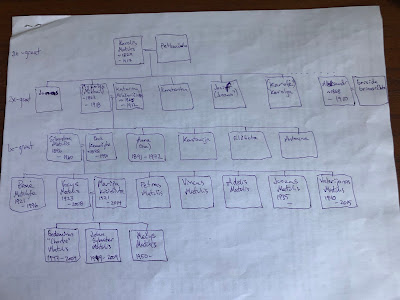 |
| Marriage of Leonas Povilauskas and Konstancija Matulis March 6, 1917 |
I searched for it mainly to confirm that Konstancija is indeed the sister of my great-grandfather, along with Anna. She is. Her parents are listed as Mikolas Matolis and Kotrina Miloszis, which are a couple of the spelling variants I've seen. Miloszis would be written as "Milošis" in Lithuanian, and this a shortened variant of the longer Milaševičius I've seen more frequently.
These spelling variations can seem quite haphazard, and even raise some doubts as to whether or not the records match up, but I'm careful to cross reference many records. These variations are the result of many external influences, such as Polish and Russian language influences, multiple alphabets, strong accents, and even sometimes low literacy. The -evič bit in the middle of Milaševičius, for example, comes from the Polish influence and many of the other spelling variations are a result of the name being recorded in multiple charcter sets over generations. The (imposition of!) the Russian cyrillic alphabet, for example, introduced many corruptions of names within families - my name Matulis, for example, has appeared as Matolis, Matuolis, Matolisov, and others within my own family.
At the time the marriage record above was produced, 1917, Lithuania was still under the control of the Tsar, hence why the document says they're Russian. I always feel compelled to say, they were NOT RUSSIAN!! You can only say they were insofar as Lithuania was momentarily occupied by the Russian Empire.
This document also tells me the parents of Leonas. I have been trying to figure out the circumstances of Anna and Konstancija's arrival in the United States. Anna appears to have emigrated as an unmarried woman in 1909, and the unmarried Konstancija joined her in 1915. I suspect that their husbands may have come from the same village, but will only be able to confirm this if I can find records of their husbands (Joseph and Leonas) in Pociuneliai, where Anna and Konstancija (and the rest of the Matulis family) comes from. The names of their parents Jurgis Sviatikis / Agnieszka Stakauskyte and Augustinas Povilauskas / Magdalena Antanaite, notwithstanding spelling corruptions, might help as I search the Lithuanian records.




